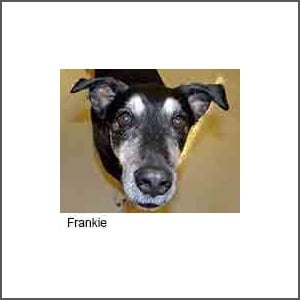
Could a trained "sniffer dog" someday replace costly, invasive techniques used to spot thyroid cancer? That's the promise of an early report on one such canine, a German Shepherd mix named Frankie.
A team at the University of Arkansas in Little Rock said that Frankie can accurately sniff out cases of thyroid cancer when presented with patients' urine samples.
If this early work pans out, "scent-trained canines could be used by physicians to detect the presence of thyroid cancer at an early stage and to avoid surgery when unwarranted," study senior author Dr. Donald Bodenner said in an Endocrine Society news release.
The findings were scheduled for presentation on Friday at the society's annual meeting in San Diego.
One expert in thyroid cancer said improvements in spotting the disease are needed.
"Currently, if a suspicious thyroid nodule is detected on ultrasound, a fine-needle biopsy is done to analyse the cells and determine if a malignancy is present," explained Dr. Maria Pena, an endocrinologist at North Shore-LIJ's Syosset Hospital in Syosset, N.Y.
But she added that "sampling error" means that accuracy from this technique is never 100 percent, and often lab tests turn up ambiguous results. All of that can lead to "additional biopsies that are uncomfortable for the patient and/or molecular testing that can be expensive," Pena said.
However, dogs have evolved a very highly sensitive sense of smell, and the Arkansas team wondered if Frankie, an abandoned mutt turned search and rescue dog, could be trained to spot the chemical signs of thyroid cancer in urine, just as canines have long been used to sniff out hidden, illicit drugs.
As part of the research, Frankie was exposed repeatedly to diseased thyroid tissue samples in order to give him an "imprint" of the smell of cancer. He was then trained to lie down after smelling thyroid cancer in a urine sample, and turn away when the sample turned out to be benign.
Read: Dogs helping in cancer fight
In a test, Frankie was asked to smell - and react to - urine samples from 34 different patients. According to Bodenner's team, the dog correctly identified cancer in 30 out of the 34 samples. This translated into a nearly 90 percent accuracy rate, with just two false-negative readings and two false-positives.
It's still too early for Frankie to be used to diagnose patients outside of a research context. But more study is already in the works, involving more canine "physicians," the researchers said.
"Scent-trained canines could be used by physicians to detect the presence of thyroid cancer at an early stage and to avoid surgery when unwarranted," said Bodenner, who is chief of endocrine oncology at the university.
Pena agreed that the approach has real promise. "Dogs have been known to detect multiple cancers -- from melanomas to breast cancers and lung cancer, just to name a few. Now this same concept is being applied to the detection of thyroid cancer," she said.
"Even though this data is still in the early stages, maybe our canine friends may help complement our current thyroid nodule biopsy process," Pena said.
Read: Sniffer dogs can detect lung cancer
Dr. Minisha Sood is an endocrinologist at Lenox Hill Hospital in New York City. She said, "Thyroid cancer is the most rapidly increasing cancer diagnosis in the United States - there are 62,450 newly diagnosed cases of thyroid cancer and 1,950 deaths from thyroid cancer per year."
But Sood agreed that the canine approach has merit and should be pursued. "A less invasive but effective method is needed to definitively diagnose thyroid cancer, so that patients can avoid unnecessary surgical procedures," she said.
This research is still early, and experts note that findings presented at medical meetings are typically considered preliminary until published in a peer-reviewed journal.
Read more:
US KaTV explores how dogs are trained to sniff out cancer




 Publications
Publications
 Partners
Partners











